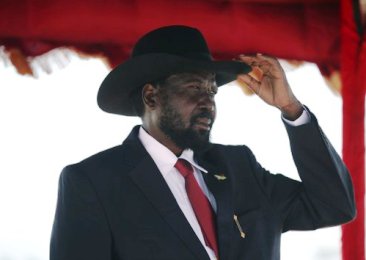Governors pledge their support to president Kiir’s leadership
July 17, 2013 (JUBA) – Four governors announced that they would support president Salva Kiir’s leadership in a move seen to be in the light of the ongoing leadership contest between the president and his deputy, Riek Machar.

Eastern Equatoria state governor, Louis Lobong, who spoke on behalf of the four governors following their meeting with the President announced on the State-owned SSTV that they had expressed their support to president Kiir’s leadership.
He said besides discussing the general situations in their respective states, they also assured the president about their support to him towards 2015.
“We also renewed our unwavering support to his leadership, to this government”, governor Lobong said, adding that they will ensure to guide the people to 2015.
He added that the president promised to support their stat administrations and in return expressed their support to his leadership.
The rare public tone by governors is a sign that the ongoing wrangling in the ruling SPLM is still ongoing with political manoeuvres below the tables.
The incumbent president Kiir is actively using his “power card” to make sure that he moulds the thinking and opinions of the senior executive members of government, most of whom are either members of both politburo and national liberation council of the party, an analyst said.
Kiir recently fired two national ministers and two elected governors, sending a clear signal that even the elected officials will have to succumb to his political wishes or may not survive their positions if they were not politically with him to face his deputy.
“The president is utilizing the current constitutional powers in his hands to intimidate and inculcate fears into officials. And this seems to work well as you can see. Whether he uses the constitutional powers in the right or wrong way is another thing,” Joseph Wani, a successful business man told the Sudan Tribune.
Wani thought Kiir would successfully intimidate the officials who hold their positions even if some of them had different views in the party and government.
“He has succeeded to send panic to the officials who hold their positions dear either as ministers or governors. They would not want to risk their positions before the 2015 elections which is far by two years”, he added.
Out of the four governors that met with the president on Wednesday, three are members of the ruling SPLM while the governor of Western Equatoria, Bangasi Bokosoro, is an independent candidate who defeated the SPLM candidate, the current national minister of Lands, Housing and Physical Planning, Jemma Nunu Kumba, in the 2010 elections.
GOVERNORS PULLED OUT SPEAKERS FORUM
The four governors were hurriedly pulled out from the governors’ forum and had to miss important presentations and deliberations on Wednesday morning as the word came that the president wanted to see them in his office.
In the forum chaired by the vice-president, Riek Machar Teny, various presentations and deliberations were made on the country’s permanent constitutional making process, the principles of democracy and on results of opinion polls of the South Sudanese citizens across the ten states about the general view of the country’s affairs.
The speakers’ forum, in addition to the governors’ forum, was created to address and tackle conflicts arising between the executive and legislature or between the national legislature and the states’ legislative assemblies.
Speaker James Wani was among those who made presentations on issues of governance in the country.
Attended by the governors and speakers of assemblies of the ten states including their ministers of parliamentary affairs, it was also a forum where representatives of the various institutions and levels of government discuss the future of governance in the country.
LEADERSHIP CONTEST
Vice-president Riek Machar said the decision to contest for the SPLM chairmanship was a final decision and that there was no turning back, adding this was a constitutional right of every citizen in the country.
In various public statements, Machar said his decision was a healthy democratic exercise which should not cause a problem.
His intention is to contest for the chairmanship of the ruling party, SPLM, which is due to elect a new leadership this year, but delayed since last May.
Machar however said even if he won the chairmanship of the SPLM this year, he would still be committed to work together with the incumbent president until 2015 when the president will step down and the new party chairman will contest for the presidential elections.
However, there are frictions to such a transition as the ruling party is not historically used to such democratic transitions of power.
Kiir’s succession to the late founder of the SPLM, John Garang de Mabior, was seen by many as a smooth entrance to power since the senior SPLM members including the current vice-president and deputy chairman, Machar, all supported Kiir to take over as the most senior official in accordance with the historical hierarchy of the movement.
Other unilateral decisions were always met with resistance. An example was a widely speculated attempt by the late chairman, John Garang, to replace his deputy, the current president Kiir, with the current Foreign Minister Nhial Deng Nhial in 2004 before the CPA was signed.
The decision almost split the movement again but the two leaders were successfully reconciled in Rumbek in November 2004 under the mediation efforts of the current vice-president, Riek Machar.
In 2008, Kiir unilaterally decided to replace Machar with either the current Speaker James Wani Igga or the current minister of Justice John Luk Jok, before the party national convention.
The decision caused the first row between the two leaders and threatened the collapse of the party’s hierarchy when Machar reacted by declaring his intention to contest for the chairmanship position and leave his seat to James Wani.
But the whole initiative was later on abandoned and the status quo continued for the next five years until today.
(ST)
